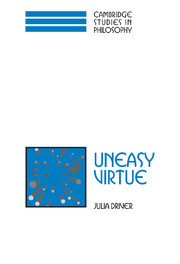
-
Select format
-
- Publisher:
- Cambridge University Press
- Publication date:
- July 2009
- April 2001
- ISBN:
- 9780511498770
- 9780521781725
- 9780521034067
- Dimensions:
- (228 x 152 mm)
- Weight & Pages:
- 0.38kg, 158 Pages
- Dimensions:
- (228 x 152 mm)
- Weight & Pages:
- 0.247kg, 160 Pages
- Subjects:
- Philosophy: General Interest, Logic, Philosophy
- Series:
- Cambridge Studies in Philosophy
You may already have access via personal or institutional login- Subjects:
- Philosophy: General Interest, Logic, Philosophy
- Series:
- Cambridge Studies in Philosophy
Book description
The predominant view of moral virtue can be traced back to Aristotle. He believed that moral virtue must involve intellectual excellence. To have moral virtue one must have practical wisdom - the ability to deliberate well and to see what is morally relevant in a given context. Julia Driver challenges this classical theory of virtue, arguing that it fails to take into account virtues which do seem to involve ignorance or epistemic defect. Some 'virtues of ignorance' are counterexamples to accounts of virtue which hold that moral virtue must involve practical wisdom. Modesty, for example, is generally considered to be a virtue even though the modest person may be making an inaccurate assessment of his or her accomplishments. Driver argues that we should abandon the highly intellectualist view of virtue and instead adopt a consequentialist perspective which holds that virtue is simply a character trait which systematically produces good consequences.
Reviews
"Uneasy Virtue is required reading for those interested in virtue theory, consequentialism, and normative ethics in general. I recommend it in the warmest terms." Metaphilosophy, Leonard A. Kahn
Contents
Metrics
Altmetric attention score
Full text views
Full text views help Loading metrics...
Loading metrics...
* Views captured on Cambridge Core between #date#. This data will be updated every 24 hours.
Usage data cannot currently be displayed.
Accessibility standard: Unknown
Why this information is here
This section outlines the accessibility features of this content - including support for screen readers, full keyboard navigation and high-contrast display options. This may not be relevant for you.
Accessibility Information
Accessibility compliance for the PDF of this book is currently unknown and may be updated in the future.


